| Listing 1 - 9 of 9 |
Sort by
|
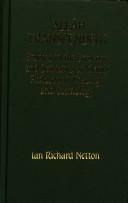
ISBN: 0415018935 9780415018937 Year: 1989 Volume: 5 Publisher: London Routledge
Abstract | Keywords | Export | Availability | Bookmark
 Loading...
Loading...Choose an application
- Reference Manager
- EndNote
- RefWorks (Direct export to RefWorks)
God (Islam) --- Islamic cosmology. --- Philosophy, Islamic. --- Islamic cosmology --- Philosophy, Islamic --- Arabic philosophy --- Muslim philosophy --- Philosophy, Arab --- Cosmology, Islamic --- Muslim cosmology --- Cosmology --- Allah --- Monotheism (Islam) --- Islam --- Islamic philosophy
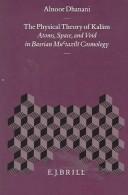
ISSN: 01698729 ISBN: 9004098313 900444484X 9789004098312 9789004444843 Year: 1994 Volume: 14 Publisher: Leiden : Brill,
Abstract | Keywords | Export | Availability | Bookmark
 Loading...
Loading...Choose an application
- Reference Manager
- EndNote
- RefWorks (Direct export to RefWorks)
This book reconstructs the theories of matter and space of the mutakallimūn of the tenth and eleventh centuries A.D. It uses texts which have only recently become available. The book presents material which challenges our previous understanding of kalām atomism. In particular, it analyzes the concept of atoms as a 'space-occupying object' without dimension yet having magnitude. It examines the manner of the atom's occupation of space, and discusses arguments for and against unoccupied spaces or the void. A detailed examination of the paradoxical nature of such an atom follows. The argument is made that a 'discrete' rather than a 'continuous' conception of space, matter, time, motion and indeed geometry underlies kalām physical theory. In this respect, the kalām atom is similar to the Epicurean minimal part.
Islam --- Islamic cosmology --- Motazilites --- Cosmologie islamique --- Mu'tazilites --- Doctrines --- History --- Histoire --- Islamic cosmology. --- doctrines --- History. --- Doctrines. --- Muʹtazilites --- Islam - Doctrines --- Motazilites - History. --- Cosmology, Islamic --- Muslim cosmology --- Cosmology --- Dogma, Islamic --- Islamic theology --- Kalam --- Muslim theology --- Theology, Islamic --- Theology, Muslim
Book
ISSN: 01698729 ISBN: 9789004206151 9004206159 9786613530509 9004217320 1280126647 9789004217324 9781280126642 Year: 2012 Volume: 85 Publisher: Leiden
Abstract | Keywords | Export | Availability | Bookmark
 Loading...
Loading...Choose an application
- Reference Manager
- EndNote
- RefWorks (Direct export to RefWorks)
This study—the first monograph devoted exclusively to al-Fārābī’s cosmology—provides a new interpretation of this thinker’s philosophical development through an analysis of the Greek and Arabic sources and a contextualization of his life and thought in the cultural and intellectual milieu of his time. It discusses key cosmological and metaphysical concepts articulated in his works, with a special focus on celestial causation, intellection, and motion. This book also examines al-Fārābī’s cosmological method and particularly the connection between astronomy, physics, and metaphysics. The result is a reassessment of al-Fārābī’s cosmology vis-à-vis late-antique Greek philosophical trends and a clearer understanding of how it creatively adapted and transformed this legacy to establish a new cosmological paradigm in Arabic thought.
Islamic cosmology --- Cosmology, Islamic --- Muslim cosmology --- Cosmology --- al-Fārābī, Abū-Nasr Muhammad. --- Abū Nasr Muhammed ibn Muhammed ibn Tarhān ibn Uzlag al-Farabi --- Alfarabius --- Alpharabius --- Fārābī --- Muhammed Ibn Muhammed (Abu Nasir) al-Farabi --- Islamic cosmology. --- Fārābī.
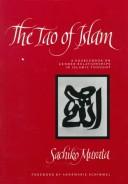
ISBN: 0585068887 9780585068886 0791409139 0791409147 9781438413938 1438413939 Year: 1992 Publisher: Albany, N.Y. State University of New York Press
Abstract | Keywords | Export | Availability | Bookmark
 Loading...
Loading...Choose an application
- Reference Manager
- EndNote
- RefWorks (Direct export to RefWorks)
Women in Islam. --- Islam --- Islamic cosmology. --- Tao. --- Religion --- Philosophy & Religion --- Dao --- Way (Chinese philosophy) --- Philosophy, Chinese --- Truth --- Virtue --- Taoism --- Cosmology, Islamic --- Muslim cosmology --- Cosmology --- Dogma, Islamic --- Islamic theology --- Kalam --- Muslim theology --- Theology, Islamic --- Theology, Muslim --- Doctrines. --- Philosophy --- Gender --- Book
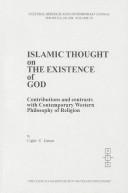
ISBN: 1565181921 9781565181922 Year: 2003 Volume: 16 Publisher: Washington (D.C.): Council for research in values and philosophy
Abstract | Keywords | Export | Availability | Bookmark
 Loading...
Loading...Choose an application
- Reference Manager
- EndNote
- RefWorks (Direct export to RefWorks)
God (Islam) --- Islamic cosmology. --- Philosophy, Islamic. --- Philosophy, Comparative. --- Philosophy and religion. --- Islamic cosmology --- Islamic philosophy --- Philosophy and religion --- Philosophy, Comparative --- Comparative philosophy --- Christianity and philosophy --- Religion and philosophy --- Arabic philosophy --- Muslim philosophy --- Philosophy, Islamic --- Cosmology, Islamic --- Muslim cosmology --- Allah --- Monotheism (Islam) --- Religion --- Philosophy, Arab --- Cosmology --- Islam
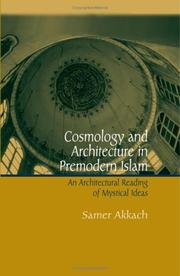
ISBN: 0791483444 1423744055 9781423744054 0791464113 9780791464113 9780791483442 9780791483442 Year: 2005 Publisher: Albany : State University of New York Press,
Abstract | Keywords | Export | Availability | Bookmark
 Loading...
Loading...Choose an application
- Reference Manager
- EndNote
- RefWorks (Direct export to RefWorks)
This fascinating interdisciplinary study reveals connections between architecture, cosmology, and mysticism. Samer Akkach demonstrates how space ordering in premodern Islamic architecture reflects the transcendental and the sublime. The book features many new translations, a number from unpublished sources, and several illustrations.Referencing a wide range of mystical texts, and with a special focus on the works of the great Sufi master Ibn Arabi, Akkach introduces a notion of spatial sensibility that is shaped by religious conceptions of time and space. Religious beliefs about the cosmos, geography, the human body, and constructed forms are all underpinned by a consistent spatial sensibility anchored in medieval geocentrism. Within this geometrically defined and ordered universe, nothing stands in isolation or ambiguity; everything is interrelated and carefully positioned in an intricate hierarchy. Through detailed mapping of this intricate order, the book shows the significance of this mode of seeing the world for those who lived in the premodern Islamic era and how cosmological ideas became manifest in the buildings and spaces of their everyday lives. This is a highly original work that provides important insights on Islamic aesthetics and culture, on the history of architecture, and on the relationship of art and religion, creativity and spirituality.
Sufism. --- Islamic cosmology. --- Islamic architecture. --- Symbolism in architecture. --- Islamic art and symbolism. --- Sofism --- Mysticism --- Cosmology, Islamic --- Muslim cosmology --- Cosmology --- Arab architecture --- Architecture, Arab --- Architecture, Islamic --- Architecture, Moorish --- Architecture, Muslim --- Architecture, Saracenic --- Moorish architecture --- Muslim architecture --- Saracenic architecture --- Religious architecture --- Architectural symbolism --- Signs and symbols in architecture --- Architecture --- Islamic symbolism --- Symbolism, Islamic --- Islamic art --- Islamic arts --- Symbolism --- Symbolism in art --- Islam --- Islamic architecture --- Symbolisme islamique --- Symbolisme en architecture --- Architecture islamique --- Cosmologie islamique --- Soufisme
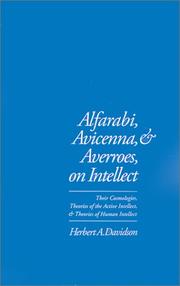
ISBN: 1280526114 019536077X 142940115X 9781429401159 9780195074239 0195074238 9781280526114 0195074238 9786610526116 6610526117 0197729940 Year: 1992 Publisher: New York Oxford University Press
Abstract | Keywords | Export | Availability | Bookmark
 Loading...
Loading...Choose an application
- Reference Manager
- EndNote
- RefWorks (Direct export to RefWorks)
Medieval Islamic, Jewish and Christian philosophers of the 16th century considered the distinction between the potential and the active intellect as a key to deciphering the nature of man and the universe. This study examines the manner in which three specific philosophers dealt with the issue.
Islamic philosophy --- Intellect. --- Philosophy of mind. --- Islamic cosmology. --- Cosmology, Islamic --- Muslim cosmology --- Cosmology --- Mind, Philosophy of --- Mind, Theory of --- Theory of mind --- Philosophy --- Cognitive science --- Metaphysics --- Philosophical anthropology --- Human intelligence --- Intelligence --- Mind --- Ability --- Psychology --- Thought and thinking --- Greek influences. --- Fārābī. --- Avicenna, --- Averroës, --- Abū al-Walīd ibn Rushd, --- Abū al-Walīd Muḥammad ibn Aḥmad ibn Rushd, --- Abū el-Walīd ibn Roshd, --- Abuʼl-Walid Muhammad bin Rusjd, --- Alṿalid ibn Rushd, --- Averroè, --- Averróis, --- Bin Rusjd, Muhammad bin Ahmad, --- Ibn-e-Rushd, --- Ibn-i Rushd, --- Ibn Rashad, --- Ibn Rochd, --- Ibn Roshd, Abū el-Walīd, --- Ibn Roshd, --- Ibn Ruschd, --- Ibn Rušd, --- Ibn Rushd, --- Ibn Rushd al-Ḥafīd, --- Ibn Rushd, Abū al-Walīd, --- Ibn Rushd, Abū al-Walīd Muḥammad ibn Aḥmad, --- Ibn Rushd, Abul Walid Muhammad ibn Ahmad, --- Ibnu Rosjid, --- Ibnu Rusjd, --- ابن رشد، --- Muḥammad ibn Aḥmad ibn Rushd, --- Al-Hosain ben Abdallah ben Sînâ, Abou Alî --- Avicenna Latinus --- Avicenne --- Avicene --- Ibn Sīnā, al-Husayn ibn 'Abd Allāh --- Al-Hoessein Ibn Abdoellah Ibn Sînâ, Abou Alî --- Abū Nasr Muhammed ibn Muhammed ibn Tarhān ibn Uzlag al-Farabi --- Alfarabius --- Alpharabius --- Fārābī --- Muhammed Ibn Muhammed (Abu Nasir) al-Farabi --- Philosophie --- Xe-XIIe s., 901-1200 --- Philosophie arabe --- Philosophie grecque --- Islamic philosophy - Greek influences --- Intellect --- Islamic cosmology --- Avicenna, - 980-1037 --- Averroës, - 1126-1198 --- Averroès, 1126-1198 --- Avicenne, 980-1037 --- Philosophy, Islamic --- Averro�es, --- F�ar�ab�i. --- Farabi. --- Averroes,

ISBN: 0195074238 Year: 1992 Publisher: Oxford [etc.] : Oxford University Press,
Abstract | Keywords | Export | Availability | Bookmark
 Loading...
Loading...Choose an application
- Reference Manager
- EndNote
- RefWorks (Direct export to RefWorks)
Averroès, --- Philosophie --- --Avicenne, --- Xe-XIIe s., --- Philosophie arabe --- --Philosophie grecque --- --Islamic philosophy --- Intellect --- Islamic cosmology --- Greek influences --- Fārābī --- Avicenna, --- Averroës, --- Islamic philosophy --- Intellect. --- Philosophy of mind. --- Islamic cosmology. --- Greek influences. --- Fārābī. --- Philosophy, Islamic --- -Human intelligence --- Intelligence --- Mind --- Ability --- Psychology --- Mental retardation --- Thought and thinking --- Arabic philosophy --- Muslim philosophy --- Philosophy, Arab --- Farabi --- Abū Nasr Muhammed ibn Muhammed ibn Tarhān ibn Uzlag al-Farabi --- Alfarabius --- Alpharabius --- Muhammed Ibn Muhammed (Abu Nasir) al-Farabi --- Philosophy of mind --- Philosophie islamique --- Philosophie de l'esprit --- Cosmologie islamique --- History --- Influence grecque --- Histoire --- Fārābī --- Averroës, --- Contributions in the theory of intellect --- Et la théorie de l'intelligence --- Mind, Philosophy of --- Mind, Theory of --- Theory of mind --- Philosophy --- Cognitive science --- Metaphysics --- Philosophical anthropology --- Cosmology, Islamic --- Muslim cosmology --- Cosmology --- Human intelligence --- Fārābī. --- Al-Hosain ben Abdallah ben Sînâ, Abou Alî --- Avicenna Latinus --- Avicenne --- Avicene --- Ibn Sīnā, al-Husayn ibn 'Abd Allāh --- Al-Hoessein Ibn Abdoellah Ibn Sînâ, Abou Alî --- Abū al-Walīd ibn Rushd, --- Abū al-Walīd Muḥammad ibn Aḥmad ibn Rushd, --- Abū el-Walīd ibn Roshd, --- Abuʼl-Walid Muhammad bin Rusjd, --- Alṿalid ibn Rushd, --- Averroè, --- Averróis, --- Bin Rusjd, Muhammad bin Ahmad, --- Ibn-e-Rushd, --- Ibn-i Rushd, --- Ibn Rashad, --- Ibn Rochd, --- Ibn Roshd, Abū el-Walīd, --- Ibn Roshd, --- Ibn Ruschd, --- Ibn Rušd, --- Ibn Rushd, --- Ibn Rushd al-Ḥafīd, --- Ibn Rushd, Abū al-Walīd, --- Ibn Rushd, Abū al-Walīd Muḥammad ibn Aḥmad, --- Ibn Rushd, Abul Walid Muhammad ibn Ahmad, --- Ibnu Rosjid, --- Ibnu Rusjd, --- ابن رشد، --- Muḥammad ibn Aḥmad ibn Rushd, --- Contributions in the theory of intellect. --- Avicenna --- al-Fārābī, Abū-Nasr Muhammad.
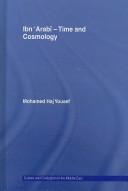
ISBN: 9780203938249 0203938240 9780415444996 0415444993 1134065914 1281063827 9786611063825 9781134065868 9781134065905 9780415664011 Year: 2007 Publisher: New York Routledge
Abstract | Keywords | Export | Availability | Bookmark
 Loading...
Loading...Choose an application
- Reference Manager
- EndNote
- RefWorks (Direct export to RefWorks)
This book is the first comprehensive attempt to explain Ibn 'Arabî's distinctive view of time and its role in the process of creating the cosmos and its relation with the Creator. By comparing this original view with modern theories of physics and cosmology, Mohamed Haj Yousef constructs a new cosmological model that may deepen and extend our understanding of the world, while potentially solving some of the drawbacks in the current models such as the historical Zeno's paradoxes of motion and the recent Einstein-Podolsky-Rosen paradox (EPR) that underlines the discrepancies between Quantum M
Islamic cosmology. --- Time. --- Islamic philosophy. --- Arabic philosophy --- Muslim philosophy --- Philosophy, Islamic --- Philosophy, Arab --- Hours (Time) --- Geodetic astronomy --- Nautical astronomy --- Horology --- Cosmology, Islamic --- Muslim cosmology --- Cosmology --- Ibn al-ʻArabī, --- Andalusi, Mehmet bin Ali, --- Ibn al-ʻArabī, Muḥyī al-Dīn Muḥammad ibn ʻAlī, --- Ibn ʻArabî, --- Ibn ʻArabi, Mohyiddin, --- İbn Arabî, Muhittin, --- Ibn ʻArabī, Muḥyī al-Dīn Muḥammad ibn ʻAlī, --- Ibn ʻArabī, Muḥyiddīn, --- Ibn-i ʻArabī, Muḥīuddīn Muḥammad bin ʻAlī T̤āʼī Undlusī ibn-i ʻArabī --- Ibn Surāqah, --- İbnʼül-arabî, Muhyiddîn, --- Magribi, Mehmet bin Ali, --- Mohyiddin ibn ʻArabi, --- Muḥammad bin ʻAlī T̤āʼī Undlusī ibn-i ʻArabī, Muḥīuddīn, --- Muḥammad ibn ʻAlī, Muḥyī al-Dīn ibn al-ʻArabī, --- Muhittin i̇bn Arabî, --- Muḥīuddīn Muḥammad bin ʻAlī T̤āʼī Undlusī ibn-i ʻArabī, --- Muhiy al Din ibn Arabi, --- Muḥyī al-Dīn ibn ʻArabī, --- Muḥyī al-Dīn Muḥammad ibn ʻAlī ibn al-ʻArabī, --- Muḥyī al-Dīn Muḥammad ibn ʻAlī ibn ʻArabī, --- Muḥyiddīn ibn ʻArabī, --- Muhyiddîn İbnʼül-arabî, --- Raʼīs al-Ṣūfīyah, --- Şeyh-i ekberi, --- Shaykh al-Akbar, --- Taʼi, Mehmet bin Ali, --- T̤āʼī Undlusī ibn-i ʻArabī, Muḥīuddīn Muḥammad bin ʻAlī, --- Undlusī ibn-i ʻArabī, Muḥīuddīn Muḥammad bin ʻAlī T̤āʼī, --- Ibnu Arabi, Muhyiddin, --- ابن العربي، --- ابن عربي --- ابن عربي، --- بن العربي --- لإبن العربي، --- محيى الدين بن عربي
| Listing 1 - 9 of 9 |
Sort by
|

 Search
Search Feedback
Feedback About UniCat
About UniCat  Help
Help News
News